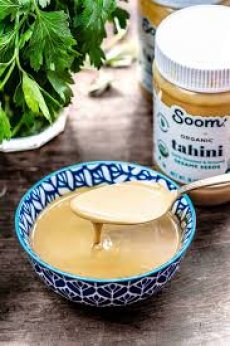
Tahini: What is it, How to Make it, and Its Benefits
Tahini, a common ingredient in many dishes from hummus to sweets like tahini and molasses, is known for its numerous health benefits. However, finding high-quality, natural tahini without additives can be difficult. So, how can you identify natural tahini, and what are the benefits of tahini? In this article, we will explain the process of tahini production, how to distinguish natural tahini, and its various benefits.
Tahini is made from sesame seeds. First, sesame seeds are soaked and cleaned from their shells. Then, the seeds are roasted at temperatures between 150-200°C, sometimes using double roasting techniques. Once roasted, the seeds are ground using sesame grinding machines, and the oil is extracted to create natural tahini. The production process avoids using any additives or oils, ensuring that the tahini remains pure and natural.
To identify natural tahini, consider the following aspects:
Consistency and Texture: Natural tahini should have a consistency that is neither too liquid nor too thick. If the tahini is watery, it likely contains additives.
Taste and Smell: Natural tahini will not have a rancid smell or an overpowering bitter taste. The aroma and flavor should be pleasant, with no signs of fermentation or mold.
Color: Natural tahini has a color consistent with the sesame seeds used. An overly light or dark color may indicate the presence of additives.
Tahini is a powerhouse of protein, minerals, and healthy fats, offering several health benefits:
Energy Boost: Tahini helps provide energy throughout the day due to its high protein and healthy fat content.
Brain Function: Rich in nutrients, tahini supports brain functions and cognitive performance.
Heart Health: Tahini promotes heart health by providing beneficial fats and minerals.
Digestive Health: Tahini helps in maintaining a healthy digestive system and promotes regular bowel movements.
Natural tahini is widely used in a variety of dishes, including breakfast, sauces, and desserts. Tahini and molasses is a traditional mix consumed especially in winter to boost immunity. Additionally, tahini sauce is commonly used in salads, sandwiches, and many other dishes.
For those who want to make tahini at home, home tahini machines are the perfect solution. These machines allow for the easy production of natural tahini without any additives, perfect for personal or small-scale use.
Tahini can spoil if stored improperly, especially when it is still in its liquid form after being ground. To ensure freshness, tahini should be stored in a cool, dry place, away from direct sunlight. If kept in a cool environment, tahini can last for several months. For longer storage, refrigeration is recommended.
If tahini becomes spoiled, it will develop a moldy smell or a greenish-blue layer on the surface. An off taste or sour odor also indicates that the tahini has gone bad. If there are no visible signs of spoilage, the tahini is safe to consume.
For the best results in tahini production, AGRIPROF Machines offer high-quality tahini grinding machines for both home and commercial use. These machines allow you to produce fresh, natural tahini with ease.
Tahini is a highly nutritious food that should always be consumed in its purest form. Whether you're making tahini at home or purchasing from a reputable producer, always ensure the tahini is natural and free from additives. With AGRIPROF Machines, you can enjoy high-quality tahini in your kitchen or business.